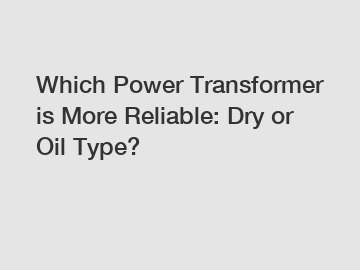Jan. 19, 2024
Electrical Equipment
BOKR contains other products and information you need, so please check it out.
Which Power Transformer is More Reliable: Dry or Oil Type?
Power transformers are a vital component in the electrical power industry. They play a crucial role in transmitting electricity efficiently and safely. When it comes to power transformers, one common debate is whether dry or oil type transformers are more reliable. Both types have their advantages and disadvantages, and choosing the right one depends on various factors. So, let's delve into this topic further and explore the reliability of dry and oil type transformers.

1. Insulation and Cooling:
One significant difference between dry and oil type transformers lies in their insulation and cooling systems. Oil type transformers rely on oil as both an insulating material and a cooling medium. The oil acts as an excellent insulator, preventing electrical discharges. It also helps in dissipating the generated heat efficiently. On the other hand, dry type transformers use solid insulation materials, such as epoxy resin, which eliminate the need for oil. The solid insulation provides excellent dielectric properties, while cooling is achieved through convection or forced air.
2. Fire Safety:
Fire safety is a critical aspect to consider when comparing the reliability of dry and oil type transformers. Oil, being a flammable substance, poses a higher fire risk in case of a fault or failure. However, modern oil type transformers are equipped with advanced fire safety features, such as explosion vents and fire detection systems. These features help minimize the risk of fire and make oil type transformers safer. On the other hand, dry type transformers, being void of combustible oils, are inherently safer from fire hazards. This makes them a preferred choice in environments where fire safety is of utmost importance, such as hospitals, high-rise buildings, and underground substations.
3. Maintenance and Lifespan:
Maintenance requirements and lifespan are crucial factors in determining the reliability of power transformers. Oil type transformers generally require more maintenance compared to dry type transformers. The oil needs regular testing and replacement, along with the inspection of other components like bushings and valves. This routine maintenance ensures the transformer operates at its optimal level. Nevertheless, if properly maintained, oil type transformers can have a long lifespan, often exceeding 30 years. In contrast, dry type transformers have minimal maintenance requirements, as they do not rely on oil. This results in relatively lower maintenance costs and an extended lifespan of up to 40 years.
4. Environmental Impact:
The environmental impact of power transformers cannot be ignored in the quest for reliability. From an environmental perspective, dry type transformers are considered more eco-friendly than oil type transformers. Since they do not rely on oil, there is no risk of oil spills or leaks, which can cause soil and water contamination. In addition, dry type transformers do not emit harmful gases, such as sulfur hexafluoride (SF6), which is commonly used as an insulating gas in oil type transformers. Hence, choosing dry type transformers aligns with the global efforts to reduce greenhouse gas emissions and protect the environment.
In conclusion, the reliability of power transformers depends on various factors, including their insulation and cooling systems, fire safety measures, maintenance requirements, and environmental impact. While oil type transformers have been widely used for decades and continue to be reliable, the advancements in technology and the rise of environmental consciousness have resulted in the increasing popularity of dry type transformers. It is crucial to consider the specific needs of the application and adhere to industry standards when selecting the most reliable power transformer. So, whether dry or oil type, the choice ultimately depends on striking the right balance between reliability, safety, efficiency, and environmental impact.
If you are looking for more details, kindly visit our website.
If you are looking for more details, kindly visit drawout breaker.
If you are interested in sending in a Guest Blogger Submission,welcome to write for us!
All Comments ( 0 )